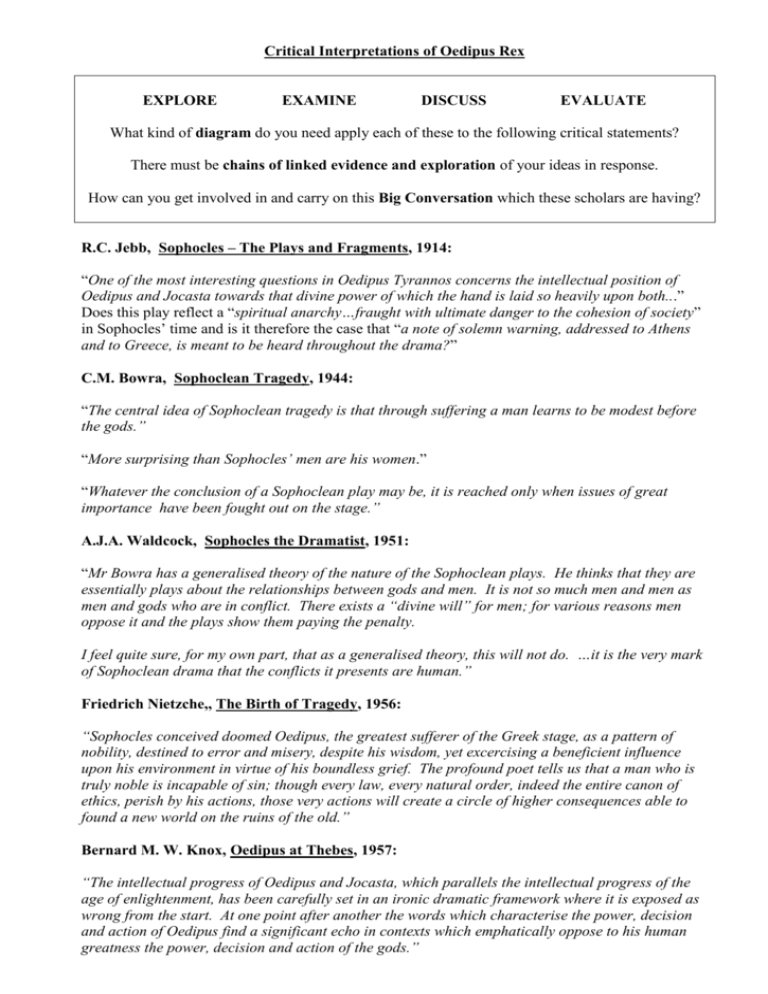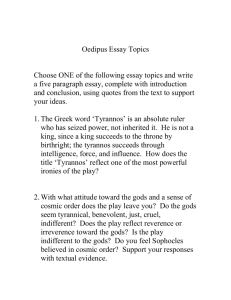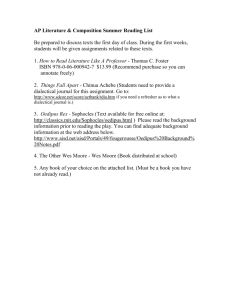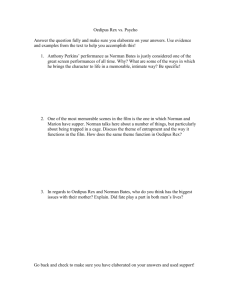Critical Interpretations of Oedipus Rex.doc
advertisement

Critical Interpretations of Oedipus Rex EXPLORE EXAMINE DISCUSS EVALUATE What kind of diagram do you need apply each of these to the following critical statements? There must be chains of linked evidence and exploration of your ideas in response. How can you get involved in and carry on this Big Conversation which these scholars are having? R.C. Jebb, Sophocles – The Plays and Fragments, 1914: “One of the most interesting questions in Oedipus Tyrannos concerns the intellectual position of Oedipus and Jocasta towards that divine power of which the hand is laid so heavily upon both...” Does this play reflect a “spiritual anarchy…fraught with ultimate danger to the cohesion of society” in Sophocles’ time and is it therefore the case that “a note of solemn warning, addressed to Athens and to Greece, is meant to be heard throughout the drama?” C.M. Bowra, Sophoclean Tragedy, 1944: “The central idea of Sophoclean tragedy is that through suffering a man learns to be modest before the gods.” “More surprising than Sophocles’ men are his women.” “Whatever the conclusion of a Sophoclean play may be, it is reached only when issues of great importance have been fought out on the stage.” A.J.A. Waldcock, Sophocles the Dramatist, 1951: “Mr Bowra has a generalised theory of the nature of the Sophoclean plays. He thinks that they are essentially plays about the relationships between gods and men. It is not so much men and men as men and gods who are in conflict. There exists a “divine will” for men; for various reasons men oppose it and the plays show them paying the penalty. I feel quite sure, for my own part, that as a generalised theory, this will not do. …it is the very mark of Sophoclean drama that the conflicts it presents are human.” Friedrich Nietzche,, The Birth of Tragedy, 1956: “Sophocles conceived doomed Oedipus, the greatest sufferer of the Greek stage, as a pattern of nobility, destined to error and misery, despite his wisdom, yet excercising a beneficient influence upon his environment in virtue of his boundless grief. The profound poet tells us that a man who is truly noble is incapable of sin; though every law, every natural order, indeed the entire canon of ethics, perish by his actions, those very actions will create a circle of higher consequences able to found a new world on the ruins of the old.” Bernard M. W. Knox, Oedipus at Thebes, 1957: “The intellectual progress of Oedipus and Jocasta, which parallels the intellectual progress of the age of enlightenment, has been carefully set in an ironic dramatic framework where it is exposed as wrong from the start. At one point after another the words which characterise the power, decision and action of Oedipus find a significant echo in contexts which emphatically oppose to his human greatness the power, decision and action of the gods.” Albin Lesky, A History of Greek Literature, 1966: “Sophocles drew his characters from the pre-existing realm of myth, characters not in the modern psychological sense, but great personal figures whose traits are attached to one central feature.” “In this drama also the noble sould with its unqualifiable determination is set off by the type that is ready always to weaken and compromise; to “take life as it comes” is Jocasta’s great maxin: the strongest possible contrast to the path that Oedipus treads.” E.R. Dodds, On Misunderstanding The Oedipus Rex, 1966: This critic set an exam question once – In what sense, if any, does the Oedipus Rex attempt to justify the ways of God to man?” and received a range of answers, some based on the above ideas, and all of which he held to be absolute rubbish! Here they are: 1. the play justifies the gods by showing that we get what we deserve. 2. Oedipus Rex is a tragedy of destiny and proves that man has no freewill but is a gods’ puppet. 3. Sophocles is a “pure” artist, not interested in justifying gods but takes a story to make an exciting play. He then argued each one out and ended up with: “ To me personally Oedipus is a kind of symbol of the human intelligence which cannot rest until it has solved all the riddles – even the last riddle, to which the answer is that human happiness is built on an illusion.” P.H. Vellacott, The Chorus in Oedipus Tyrannos, 1967: “The author meant his audience to understand that from the beginning of the Second Stasimon the chorus are convinced of Oedipus’ double guilt AND WHO HAS SAID WHAT NEXT/SINCE?








